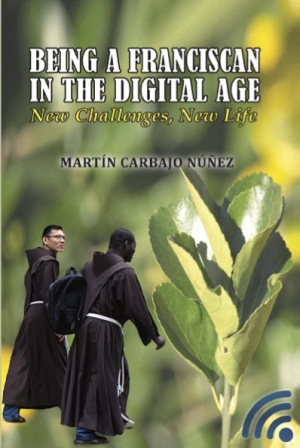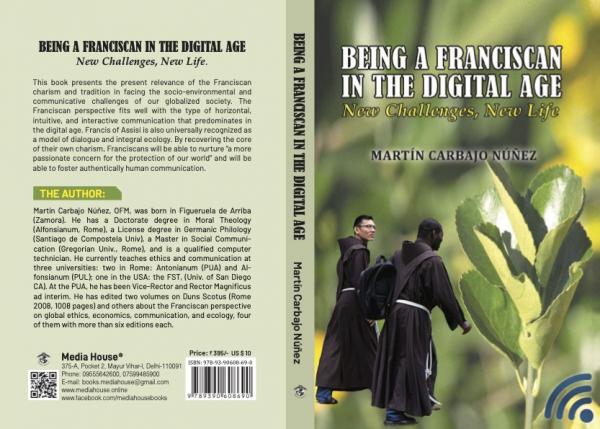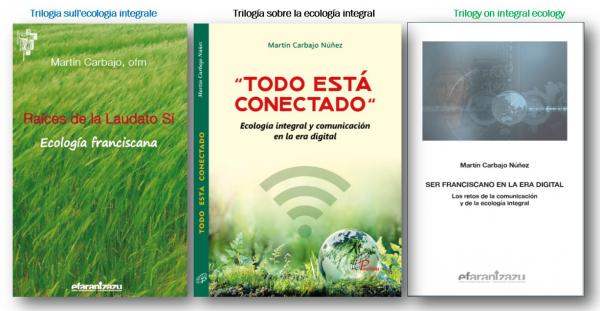 Carbajo N˙˝ez MartÝn ,
Being a Franciscan in the Digital Age: New Challenges, New Life,
Ed. Media House,
Delhi,
2021
, 262 (ISBN 978-93-90608-69-0).
Carbajo N˙˝ez MartÝn ,
Being a Franciscan in the Digital Age: New Challenges, New Life,
Ed. Media House,
Delhi,
2021
, 262 (ISBN 978-93-90608-69-0).
This book presents the present relevance of the Franciscan charism and tradition in facing the socio-environmental and communicative challenges of our globalized society. The Franciscan perspective fits well with the type of horizontal, intuitive, and interactive communication that predominates in the digital age. Francis of Assisi is also universally recognized as a model of dialogue and integral ecology. By reassuming the core of their own charism, Franciscans will be able to nurture “a more passionate concern for the protection of our world” and will be able to foster authentically human communication.
The book shows the current importance of certain basic human attitudes, such as listening, contemplation, discernment, dialogue, and a good economic management. Franciscan witness of the logic of gift in these areas should be as important and significant today as it has been throughout history.
ISBN: 978-93-90608-69-0
Buy it: Book shop (via Merulana 124) - Buy online - Assisi Bookshop
+ info -- Curriculum Vitae ecología -
This book is the third of the trilogy that Prof. Carbajo has published on integral ecology:

Contents:
Abbreviations 7
Introduction 13
I. A glorious history of service and self-giving 19
1. Revitalizing consecrated life today 21
1.1. REDUCED TO JUST KEEPING AND ADMINISTERING 21
1.1.1. The danger of a certain immobility 22
1.1.2. The crowding-out effect 23
1.2. “BE TRANSFORMED BY THE RENEWAL OF YOUR MIND” 25
1.2.1. To renew ourselves by theological virtues 25
1.2.2. Open to novelty and change 27
1.2.3. “Let's start, brothers” 28
1.3. THE IMPORTANCE OF LEADERSHIP 29
1.3.1. The crowding-out effect: from the “why” to the “what” 30
1.3.2. Characteristics of these three leaderships 31
1.3.3. In the light of the Spirit and according to God 33
1.4. THE NEED TO FOSTER FRATERNAL LIFE 34
1.5. SUMMARIZING 35
2. St. Francis, mystic and pilgrim: An inspiring model for today 37
2.1. MYSTICISM AND SPIRITUALITY IN THE ECOLOGICAL FIELD 38
2.1.1 An inner motivation that encourages and gives meaning 38
2.1.2. A Holistic, integrated vision 40
2.2. FRANCIS OF ASSISI, MYSTIC AND PILGRIM 41
2.2.1. Rising up to God 42
2.2.2. Pilgrim and stranger 45
2.2.3. Inspirer of a kinship ecology 47
2.3. THEOLOGICAL VISION OF CREATION 49
2.3.1. Trinitarian dimension 49
2.3.2. Amazement and contemplation 50
2.3.3. One in Christ 51
2.4. SUMMARIZING 52
3. From St. Francis to Pope Francis: an evangelizing lifestyle 55
3.1. LIFESTYLES: THE PILGRIM 56
3.1.1. Spiritual life as pilgrimage 57
3.1.2. Moving towards the goal 59
3.2. THE TOURIST 61
3.2.1. Away from himself 61
3.2.2. Away from others 62
3.2.3. Away from God 64
3.2.4. Away from nature: indolent consumerism 64
3.3. THE EVANGELIZER IS A PILGRIM 65
3.3.1. Witnesses who announce what they have experienced 65
3.3.2. A joyful and ever new announcement 66
3.4. HUMBLE CONTEMPLATIVE WHO LISTENS AND ACCOMPANIES 66
3.5. AFFECTIONATELY UNITED TO ALL 68
3.5.1. Evangelization as “real and sincere closeness.” 68
3.5.2. In profound harmony with the People of God 69
3.6. SUMMARIZING 70
4. Franciscan contribution to economics, science, and society 73
4.1. THE PROCESS OF RATIONALIZATION 75
4.1.1. Max Weber’s thesis 75
4.1.2. Separation between “heavenly” and “earthly” realms 79
4.1.3. From the vision of faith to consumerism 80
4.1.4. The debate on Weber’s thesis 81
4.1.5. Material progress, competitiveness, and secularization 83
4.2. THE FRANCISCAN CONTRIBUTION TO THE PROCESS OF RATIONALIZATION 85
4.2.1. A holistic science, always linked to theology and
morality 85
4.2.2. Contribution to modern economy 86
a) Mounts of Piety, microcredit, and civil economy 87
b) Double entry accounting 89
4.2.3. The beginnings of modern experimental science 90
4.2.4. Bases of modern epistemology 92
4.2.5. Subjective Rights and Constitutionalism 93
4.2.6. Political management of the market on rational basis 95
4.2.7. Setting the method of modern ethnographic studies 97
4.3. SUMMARIZING 100
5. Current relevance of the Franciscan perspective 103
5.1. FRANCIS OF ASSISI, A UNIVERSAL MODEL OF REFERENCE 104
5.1.1. Some testimonies about Francis’ importance today 104
5.1.2. An inspiration for the ecological movement 106
5.2. ECCLESIASTICAL MAGISTERIUM AND FRANCISCANISM 107
5.2.1. Paul VI: Duns Scotus as a model of dialogue 108
5.2.2. John Paul II: Dialogue in the “Spirit of Assisi” 108
5.2.3. Benedict XVI and the Franciscan intellectual tradition 109
a) Caritas in Veritate, a Franciscan encyclical 110
b) The primacy of the loving will 111
5.2.4. Pope Francis 111
a) A real and sincere closeness 112
b) Sister creatures 113
5.3. THE PATH OF BEAUTY 113
5.4. FRANCISCAN VALUES WHICH ARE PARTICULARLY RELEVANT TODAY 116
5.4.1. Freedom and gratuitousness 116
5.4.2. Fraternity and individuality 117
a) Fraternity vs solidarity 117
b) Individuality versus individualism 118
5.5. SUMMARIZING 120
II. A great history still to be accomplished! 123
6. Hearing the cry of the earth and the cry of the poor 125
6.1. “THIS POOR ONE CRIED OUT AND THE LORD HEARD” 126
6.1.1. “Blessed are those who hear the word” 127
6.1.2. Openness to God makes listening possible 127
6.2. WE ARE HEARERS OF THE WORD 128
6.2.1. Listening to God who speaks to us in our conscience 129
6.2.2. Listening to oneself 129
6.3. LISTENING TO OTHERS 130
6.3.1. Listening is more than hearing 131
6.3.2. Listening is interactive 132
6.3.3. The poor need to be heard 133
6.4. THE CRY OF THE EARTH 134
6.5. LISTENING IN FRANCISCAN PERSPECTIVE 135
6.5.1. Francis, hearer of the Word 136
6.5.2. Francis listens to his own being and opens himself to otherness 137
6.5.3. Let them listen to and obey one another 137
a) Poor and minors to be brothers 138
b) Listening and affectionate closeness as privileged
means of evangelization 138
6.5.4. Listening and prayerful contemplation of nature 139
6.6. SUMMARIZING 140
7. Seeing and contemplating the faces of God 143
7.1. A SPIRITUALITY OF EVERYDAY LIFE 144
7.1.1. A mysticism of open eyes 145
7.1.2. Holiness is linked to relationships 146
7.2. THE FACES OF GOD 147
7.2.1. The beautiful face of Christ crucified 148
7.2.2. Saints with a joyful face 149
7.2.3. Contemplating Christ in the faces of the poor and the suffering 150
7.2.4. The face of creation 151
7.3. CONTEMPLATING THE FACES OF GOD IN THE DIGITAL CULTURE 154
7.3.1. The difficulty of going forth and serving 155
7.3.2. The need to assume one's own identity 156
7.3.3. The faces in the digital fraternity 156
7.3.4. People talk about nature without looking at its face 157
7.4. SUMMARIZING 158
8. Discerning in our hyper-accelerated society 159
8.1. DISCERNMENT 160
8.1.1. Necessity and purpose of discernment 161
8.1.2. Francis of Assisi practiced it constantly 161
8.1.3. Elements of discernment 163
8.1.4. Renewing the mind and growing in mercy 163
8.2. DIGITAL CULTURE AND DISCERNMENT 164
8.2.1. Relationships conditioned by technology 165
8.2.2. Discernment in the Digital Age 166
8.2.3. Learning from the past to live in truth 168
8.3. SUMMARIZING 170
9. Dialogue in the “Spirit of Assisi” 173
9.1. A SECULAR AGE 174
9.1.1. Immanent humanism: “etsi Deus non daretur” 175
9.1.2. Scientism 175
9.2. PROPOSALS TO ENSURE PEACE 176
9.2.1. The necessary collaboration at all levels 177
9.2.2. Global Ethics 178
9.2.3. Interreligious dialogue 179
9.3. RELIGIONS AND PEACE FROM A CATHOLIC PERSPECTIVE 180
9.3.1. Dialogue as a priority 180
9.3.2. Religion wars, an expression of immaturity 182
9.3.3. Nostra Aetate: interreligious and intercultural dialogue 184
9.3.4. The Seeds of the Word (Semina Verbi) 186
9.4. THE SPIRIT OF ASSISI 188
9.5. THE NECESSARY CHANGE OF MENTALITY IN THE SPIRIT OF
ASSISI 190
9.6. SUMMARIZING 191
10. Economic sustainability of the Franciscan family 193
10.1. THE DIFFICULT RELATIONSHIP BETWEEN RELIGION AND
MONEY 193
10.2. A CHANGING ECONOMIC SITUATION 196
10.2.1. Less young friars working as employees 196
10.2.2. Growing dependence on rents and investments 197
10.2.3. Sharing with the poor and donations received 198
10.3. SUSTAINABILITY IN THE LIGHT OF FRANCIS OF ASSISI 199
10.3.1. Working humbly 200
10.3.2. In the logic of gift 200
10.3.3. Giving back instead of accumulating 202
10.4. A FRANCISCAN ECONOMY TODAY 202
10.4.1. Labor as the main source of income and livelihood 203
10.4.2. A sober lifestyle in the logic of gift 204
10.4.3 Promoting an ecocentric economy 205
10.4.4. Restitution and sharing 207
10.4.5. At the service of integral ecology 208
General conclusion 211
Bibliography 215
Name Index 245
Subject Index 251
En español:
Este libro presenta la actualidad del carisma y de la tradición franciscana para afrontar los retos socioambientales y comunicativos de la sociedad globalizada. La perspectiva franciscana encaja bien con el tipo de comunicación horizontal, intuitiva e interactiva que predomina en la era digital. Francisco de Asís es también universalmente reconocido como modelo de diálogo y de ecología integral. Recuperando el núcleo del propio carisma, los franciscanos podrán “alimentar una pasión por el cuidado del mundo” (LS 217) y podrán favorecer una comunicación auténticamente humana.
Desarrollando la capacidad de escuchar, contemplar, discernir, dialogar y administrar los bienes en la lógica del don, los franciscanos podrán seguir siendo “los frailes del pueblo” y ayudarán a afrontar los actuales retos socioambientales y comunicativos, abriendo a un futuro de esperanza. “El mundo viejo ha pasado. Mira que hago un mundo nuevo” (Ap 21,5).
ISBN: 978-84-7240-323-9
Acquista: Libreria (via Merulana 124) - Compra online --- + info -- Curriculum Vitae ecología -

Edizione in italiano:
Questo libro presenta la rilevanza del carisma e della tradizione francescana nell'affrontare le sfide socio-ambientali e comunicative della società globalizzata. La prospettiva francescana si adatta bene al tipo di comunicazione orizzontale, intuitiva e interattiva che predomina nell'era digitale. Francesco d'Assisi è anche universalmente riconosciuto come un modello di dialogo e di ecologia integrale.
Recuperando il nucleo del proprio carisma, i francescani saranno in grado di "alimentare una passione per la cura del mondo" (217) e potranno favorire una comunicazione autenticamente umana.
ISBN 979-12-80562-11-1
Per acquistarlo: Libreria (via Merulana 124) - Casa edtrice online -- Curriculum Vitae ecología
Książka oddana do rąk polskiego Czytelnika zachęca do refleksji nad tym jak franciszkanie mogą żyć swoim charyzmatem w epoce cyfrowej. Nowy kontekst społeczny stawia nowe wyzwania, a tym samym wymaga rozeznania własnego życia. Jak sprostać obecnym wyzwaniom społeczno-środowiskowym i komunikacyjnym?
Perspektywa franciszkańska dobrze wpisuje się w typ komunikacji horyzontalnej, intuicyjnej i interaktywnej, który dominuje w erze cyfrowej. Franciszek z Asyżu jest także powszechnie uznawany za wzór dialogu i ekologii.
Książka ta jest trzecią z trylogii, którą prof. Carbajo wydał na temat ekologii integralnej:
Parole chiave: Franciscanism, Integral ecology, Communication, Religious life, Catholic Social Teaching
(File allegato) |
